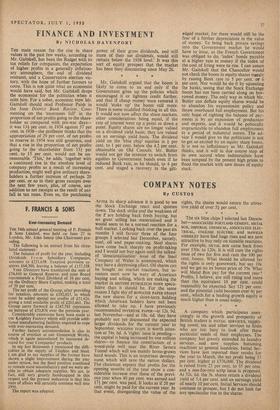FINANCE AND INVESTMENT
By NICHOLAS DAVENPORT
THE main reason for the rise in share values in the past few weeks, according to Mr. Gaitskell, has been the Budget with its tax reliefs for companies, the expectation of higher profits in a generally inflation- ary atmosphere, the end of dividend restraint, and a Conservative election vic- tory, with the hope of further favours to come. This is nut quite what an economist would have said, but Mr. Gaitskell drops the economist for the politician when it suits him. For a saber, economic view Mr. Gaitskell should read Professor Paish in the June District Bank Review. Com- menting on the 'enormous fall' in the proportion of net profits going to the share- holder as compared with pre-war days— it was 13+ per cent. in 1954 against 37 per cent. in 1938—the professor thinks that the appropriation of 29 per cent. of net profits to reserve in 1954 was still generous, and that a rise in the proportion of net profits going to the shareholder from 13+ per cent. to 15 per cent. would not be un- reasonable. 'This,' he adds, 'together with a continued rise in the absolute level of company profits as a result of increasing production, might well give ordinary share- holders a further increase of perhaps 20 per cent. or so in their gross receipts over the next few years, plus, of course, any addition to net receipts as the result of any fall in tax rates. Even so, the purchasing power of their gross dividends, and still more of their net dividends, would still remain below the 1938 level.' It was this sort of equity prospect that the market has been busy discounting since May 26.
* * * Mr. Gaitskell argued that the boom is likely to come to an end only if the Government gives up the policies which encouraged it or tightens credit further, and that if cheap money were restored it would 'stoke up' the boom still more. There is some muddled thinking in all this. It would not now affect the share markets, other considerations being equal, if the rate of interest went up a point or down a point. Equity shares are no longer valued on a dividend yield basis; they are valued on an earnings yield basis. The dividend yield on the 'blue chip' equities is # per cent. to 1 per cent. below the 4.2 per cent. obtainable on Old Consols. Mr. Butler would not get the investor to switch from equities to Government bonds even if he reduced Bank rate, as he should, to 4 per cent. and staged a recovery in the gilt-
edged market, for there would still be the fear of a further depreciation in the value of money. To bring back private savings into the Government market he would have to issue, as the French Government was obliged to do, 'index' bonds payable at a higher rate in money if the index of the cost of living were to rise. I can assure Mr. Gaitskell that the Chancellor would not check the boom in equity shares morely by raising Bank rate to 5 per cent. or' 6 per cent. Nor would he do it by squeezing the banks, seeing that the Stock Exchange boom has not been carried along on bor- rowed money. The only way in which Mr. Butler can deflate equity shares would be to abandon his expansionist policy and throw overboard full employment. But his only hope of righting the balance of pay- ments is by an expansion of production and exports, and it would be politically impracticable to abandon full employment in a period of industrial unrest. The ad- vice I would give to the politicians is not to get so excited by an equity share boom. It is not so inflationary as Mr. Gaitskell thinks, and it will in due course stop of its own accord when industrialists have been tempted by the present high prices to flood the market with new issues of equity stock.














































 Previous page
Previous page